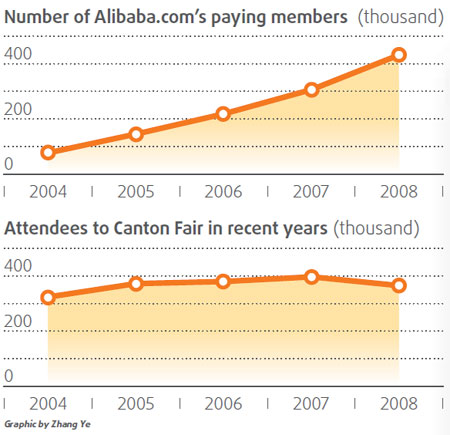
|
BIZCHINA> Top Biz News
 |
|
Threat from online markets
By He Bolin (China Daily)
Updated: 2009-05-11 08:01
 It is not just financial difficulties being faced by many companies that have led to a fall in the number of people attending Canton Fair and placing orders, but also the growing maturity of online market places. Alibaba.com in particular has experienced a dramatic rise in volumes of trading. It sells thousands of items from facemasks to flowers and tiles to toys. Not only is its service comprehensive, customers do not even have to leave the comfort of their home to make purchases. A typical example is Shi Mingfei, 40, who is general manager of a Shenzhen-based electronic enterprise. He acknowledged the economic gloom played a part in deciding not to attend the fair but added the most important factor was the ascendance of retail on the Internet.
Shi registered his company with Alibaba.com three years ago while looking for business. It is China's leading business-to-business e-commerce portal. Since he signed up his online business has grown to contribute about 20 percent of the company's annual revenue. He reckons the move has shielded his company from the vicissitudes of the financial world, allowing him to maintain roughly the same annual turnover of about $733,000. Alibaba.com is based in Hangzhou. It was founded in 1999 by former teacher Ma Yun (Jack Ma). In 2008 it attracted at least 23 million visitors, of which 65 percent were from China. Its paying members surged more than 40 percent this year to 481,474 at present, while its users worldwide and registered enterprises increased by 38 percent and 56 percent respectively to 38.1 million and 4.6 million. Its 2008 revenue also rose to 439.9 million, a 39 percent increase. Quarterly revenue rose year-on-year by 18.6 percent to $118.3 million, according to the company's quarterly financial report released last Wednesday. Alibaba.com was listed in the Hong Kong Stock Exchange at the initial public offering price of HK$13.5 on November 5, 2007, raising HK$11.6 billion ($1.5 billion) in the second-largest initial public offering sale of an Internet company after Google Inc.
It lowered its fees for product listings when the economy started to nosedive in order to attract customers from traditional trade fairs. Garment producer Fu Qiang, from Hangzhou, Zhejiang Province, said he has accumulated more than 60 long-term buyers from Alibaba, whose orders range from several hundred to tens of thousands of articles. He says he can also sell 300 to 500 items of clothing to individual buyers every day through the platform. Fu said his company was not big enough to take it to the Canton Fair. But even bigger companies including foreign buyers had shown a reluctance to pay the cost of the journey to Guangzhou this year. The fair, which ended on Thursday, suffered a fall in the number of overseas purchasers of 9,126 to 165,436. Agreed export deals fell by $5.32 billion to $26.23 billion, fair spokesman Mu Xinhai told a news conference. "Producers in the past paid $30,000 or more for a booth," said booth broker Zhang Zhaoxing. "I could easily make $10,000 in commission, almost enough for the whole year. This year I've only made a few hundred dollars because the cost of booths has fallen and people were reluctant to pay too much." E-commerce still has a long way to go before it dominates the market. People have formed good working relations at Canton Fair, said Zhang, and the best market performers still exhibit there. "You may say some companies have moved from Canton to Alibaba and similar online portals, but the deciding factor in major business deals is a face-to-face meeting," said Xiang Xiaoshan, an Alibaba business manager. "Online business-to-business platforms do provide much more business opportunities but, paradoxically, people take much longer to decide and a deal because there is so much choice," said Xiang. Beijing analyst Yu Ming said it appeared that Alibaba.com and the Canton Fair organizers were keen to co-exist peacefully. The fair organizers had in the past made unsuccessful attempts to operate it online. "China has more than 34 million small- and medium-sized enterprises (SMEs), but only less than 11 million of them have engaged in e-commerce," said Wang Shutong, chief executive officer of major online business-to-business operator DHgate.com. "The amount of export business completed online is only 4 percent of the entire exports by all the SMEs. Therefore e-commerce still has great potential in attracting new users." (For more biz stories, please visit Industries)
|
|||||